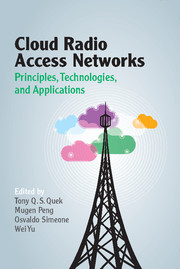Preface
Published online by Cambridge University Press: 23 February 2017
Summary
Cloud radio access networks (C-RANs) refer to a wireless cellular architecture in which all network functionalities of conventional base stations, apart from radio frequency operations and possibly analog-digital conversions, are carried out at a central cloud processor. The idea was relegated for many years to the realm of information- and communication-theoretic studies, which promised gains in terms of spectral efficiency thanks to the possibility of implementing joint baseband processing at the central processor. The main obstacles to the deployment of C-RAN-type systems were thought to be the high complexity of the necessary cloud processor as well as the limited availability of high-speed backhaul links connecting edge and cloud.
In recent years, advances in cloud computing and a more pervasive deployment of fiber optic cables and high-frequency wireless backhaul links towards the network edge have spurred the reconsideration, and eventually the implementation, of cloud-based radio access systems. In fact, as argued in the seminal white paper by China Mobile, not only can the C-RAN architecture reap the spectral efficiency gains promised by academic studies, it can also crucially reduce capital and operating expenses. This is a consequence of the centralization of network resources in the cloud: the complexity and cost of edge nodes can be drastically reduced with respect to conventional base stations, and updates and maintenance can be performed solely at the cloud.
As C-RAN moves from paper to the real world, industry and academia are working towards the definition of protocols and algorithms at all layers of the communication protocol stack, so as to enable cost-effective and high-performance cloud-based systems to be widely adopted as a leading solution for 5G networks.
This book is intended to provide a broad overview of the current research activity in the industry and academia on the subject of C-RANs. While this is an active field of study, involving theoreticians and practitioners, the editors believe that the current state of the art is sufficiently mature to warrant a monographic treatment. The book covers the architecture, physical-layer design, resource allocation, and networking of C-RAN systems, in separate parts each consisting of various chapters authored by leading researchers in both industry and academia.
It is our hope that this book will serve as a useful reference for engineers and students and that it will motivate more researchers to undertake the numerous open problems highlighted in the following pages.
- Type
- Chapter
- Information
- Cloud Radio Access NetworksPrinciples, Technologies, and Applications, pp. xvPublisher: Cambridge University PressPrint publication year: 2017



